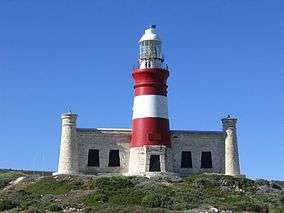Cape Agulhas Lighthouse
 Cape Agulhas Lighthouse | |
 South Africa | |
| Location | L'Agulhas, Western Cape, South Africa |
|---|---|
| Coordinates | 34°49′46″S 20°00′32″E / 34.829389°S 20.008911°ECoordinates: 34°49′46″S 20°00′32″E / 34.829389°S 20.008911°E |
| Year first constructed | 1849 |
| Deactivated | 1968–1988 |
| Construction | sandstone tower |
| Tower shape | cylindrical tower with balcony and lantern rising from one-story keeper's house |
| Markings / pattern | red tower with a white band, white lantern |
| Height | 27 m (89 ft) |
| Focal height | 31 m (102 ft) |
| Current lens | 1st order Fresnel |
| Light source | mains power |
| Intensity | 7,500,000 cd |
| Range | 30 nmi (56 km; 35 mi) |
| Characteristic | Fl W 5s |
| Admiralty number | D6370 |
| NGA number | 32208 |
| ARLHS number | SAF-004 |
| Managing agent | South African National Parks[1] |
The Cape Agulhas Lighthouse is situated at Cape Agulhas, the southernmost tip of Africa. It was the third lighthouse to be built in South Africa, and the second-oldest still operating, after Green Point.[2] It is located on the southern edge of the village of L'Agulhas, in the Agulhas National Park; the light is operated by Transnet National Ports Authority.
History
A lighthouse at Cape Agulhas was suggested by Colonel Charles Collier Michell, the Surveyor-General of the Cape, in March 1837. A public meeting at Cape Town on 11 July 1840 resolved to raise funds for the construction of the lighthouse, and Michiel van Breda, the founder of Bredasdorp, offered to donate the land on which it was to be built. Apart from local contributions, funds were received from Bombay, Calcutta, Madras, Manila, St Helena and London; by June 1843 the sum raised was £1,479.3s.9d (£1,479.19).[3]
In 1847, the government of the Cape Colony agreed to fund the construction at a cost of £15,871; building work began in April of that year and was completed in December 1848, and the light was first lit on 1 March 1849. Originally, it was fuelled by the tail-fat of sheep, but in 1905 an oil-burning lantern was installed. In March 1910, the lens was replaced with a first-order Fresnel lens. In 1929, the oil burner was replaced by a petroleum vapour burner, which was in turn replaced in 1936 by a four-kilowatt electric lamp powered by a diesel generator.[3]
In 1968, the lighthouse was taken out of service, and the light moved to an aluminium tower, as it was discovered that the sandstone walls were crumbling due to excessive weathering. The building was declared a national monument in 1973 and is also a Western Cape provincial heritage site.[4] Restoration and reconstruction was performed by the Bredasdorp Shipwreck Museum and the local council, and the lighthouse was recommissioned in 1988.[3][5]
Characteristics
The lighthouse consists of a round tower, 27 metres (89 ft) high and painted red with a white band, that is attached to the keeper's house, which now contains a museum and restaurant.[6] The design of the building was inspired by the Pharos of Alexandria.[5] The focal plane of the light is 31 metres (102 ft) above high water; the range of the 7.5 megacandela lantern is 30 nautical miles (56 km; 35 mi). The rotating optic gives off one white flash every five seconds.[7]
See also
References
- ↑ Cape Agulhas The Lighthouse Directory. University of North Carolina at Chapel Hill. Retrieved 21 March 2016
- ↑ "Cape Agulhas Lighthouse Celebrates 150th Anniversary". Lighthouse Digest. May 1999. Retrieved 18 June 2011.
- 1 2 3 "Lighthouse History". L'Agulhas.co.za. Archived from the original on 19 October 2007.
- ↑ "Cape LAgulhas Lighthouse Bredasdorp District". Gazetted Heritage Sites database. South African Heritage Resources Agency. Retrieved 28 June 2011.
- 1 2 "Cape Agulhas". Transnet National Ports Authority. Archived from the original on 25 September 2011. Retrieved 18 June 2011.
- ↑ "Lighthouses of Western South Africa". The Lighthouse Directory. Retrieved 18 June 2011.
- ↑ "Cape Agulhas". Lighthouses of South Africa. Retrieved 18 June 2011.
Further reading
- LIGHTHOUSES – Returns to an Address of the Honourable The House of Commons. House of Commons of the United Kingdom. 1 August 1850.
External links
| Wikimedia Commons has media related to Cape Agulhas Lighthouse. |